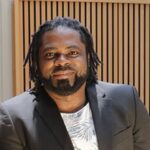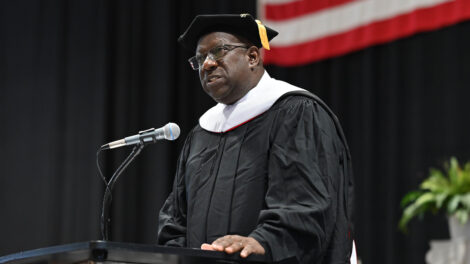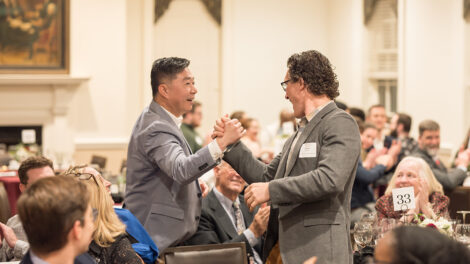Prof. Rogers Orock releases book, ‘Conspiracy Narratives from Postcolonial Africa’
 Rogers Orock, assistant professor of Africana studies
Rogers Orock, assistant professor of Africana studies
Conspiracy Narratives from Postcolonial Africa: Freemasonry, Homosexuality, and Illicit Enrichment
Released Oct. 9, 2024
Conspiracy Narratives from Postcolonial Africa, a summary:
Co-authored by me and Peter Geschiere, Conspiracy Narratives from Postcolonial Africa: Freemasonry, Homosexuality, and Illicit Enrichment examines public representations and narratives about homosexuality, Freemasonry, and the illicit enrichment of elites in two Francophone African countries, Cameroon and Gabon. We do this by tracking widespread rumors and conspiracy theories about elites that crystallize local anxieties about the entanglement of same-sex issues, elite affiliations in Western esoteric organizations like Freemasonry, and the spectacular enrichment of elites amid widening inequalities.
Driven by these three connecting objects—same-sex issues, Freemasonry, and illicit enrichment—these anxieties and suspicions define popular perceptions of elites as well as illuminate some of the recent political developments in African politics. For example, rumors and conspiracy narratives that link Freemasonry (a Western esoteric organization imported to Africa through colonialism) to homosexuality help to reinforce the false claim, now made by many on the African continent, that homosexuality is “un-African” and imposed by colonialism. Furthermore, these popular perceptions of same-sex relationships and Freemasonry as “foreign” objects of power and illicit enrichment by elites also help to explain why these are also seen as new practices within a more familiar idiom of witchcraft or occult politics.
Throughout the book, we adopt a more historicized and critical approach to discuss this complex entanglement (Freemasonry, homosexuality, and illicit enrichment) as a kind of “epistemological knot” or framework for understanding how rumors and conspiracy theories construct popular narratives about postcolonial elites, sexualities, and power in these Francophone African settings.
Where is it available?
The book is available in paperback, hardcover, and ebook editions, and it can be purchased on the University of Chicago Press website as well as on Amazon.
Why did you write this book, and why should people at Lafayette and beyond read it?
Same-sex intimacy remains a highly sensitive and controversial subject across many countries in Africa owing to moral judgments, discrimination against members of same-sex communities, and a shift toward the criminalization of LGBTQI persons. Cameroon and Gabon represent interesting, even special, examples of these developments in Africa. For example, in Cameroon and Gabon, accusations of same-sex intimacy were first made as an attack against the elites and the governments. This contrasts markedly with most African countries (e.g., Uganda or Ghana), where it is the elites and governments that drive anti-queer hostility toward LGBTQI communities. My co-author, Geschiere, and I felt that it was essential to situate and contextualize these developments in Cameroon and Gabon within broader debates in Africa and globally, primarily by examining the social, cultural, and historical factors that underpin popular discourses and political actions on the subject.
Quite remarkably for us is that in both settings, same-sex intimacy has been repeatedly linked to occult imaginaries about the wealth and power of the elite. Thus, in both countries, hostility toward queer sexualities is mainly directed against the national elite who supposedly impose same-sex relationships on young people eager for opportunities for upward social mobility. In other words, homophobia is principally an attack on the regimes in power. Of course, as we show in the book, this attack on elites leads public authorities to criminalize and harass members of the LGBTQI communities who pay the price when they are imprisoned or even killed in some cases.
Another important point of our book is the role of rumors and conspiracy theories for understanding popular representations of same-sex issues in relation to the power elite. Beyond Cameroon and Gabon in Africa, our book provides a useful illustration of how to think about and engage critically with rumors and conspiracy theories as legitimate objects of inquiry for understanding current political developments in Africa or even here in the United States. Indeed, here in the United States there are also all kinds of conspiracy theories on the political left and the political right—a subject first brilliantly discussed by the American historian Richard Hofstadter in his books on American political traditions and anti-intellectualism, and recently revisited by Russell Muirhead and Nancy Rosenblum who wrote A Lot of People Are Sayin (2019).
Fueled by skepticism about official accounts of events such as the Sept. 11 attacks and growing distrust in public authorities and institutions, our political discourse is now defined by phrases like “alternative facts” and “post-truth,” suggesting a gradual but steady erosion of what constitutes shared and reasoned truth and its value in public life. Conspiracy theories today range from QAnon’s speculations about the dark power of a plotting and unelected elite in the “deep state,” through the alleged evil of pedophilic Democratic Party officials in the so-called “Pizzagate” affair, to the biomedical conspiracy of COVID-19 and its mandates for face masks. Even U.S. elections are not immune to the contagious effects of conspiracy thinking. How should we deal with this proliferation of conspiracy theories across a wide range of subjects? Why do some conspiracy theories find credibility and efficacy at some point and then become dismissed or ineffective at other points in time? These are some of the challenges that we hope our book helps readers to think about.
Previously, following earlier scholars like Richard Hofstadter, academics tended to see it as their first task to catalog and then refute such conspiracy theories. In doing so, conspiracy theories were mostly dismissed, confined to the margins as the expressions of paranoid thinking. However, we have realized that this is a futile, even counterproductive approach. The more these are dismissed by academics who are seen as part of the elite, the more credibility and traction these seem to gain. This explains in part why higher education institutions are themselves under assault, as they are seen as an integral part of the political establishment. Of course, as narratives seek to provide alternative explanations that aim to compete with existing, official, and/or reasonably established explanations, taking conspiracy theories seriously is also challenging. Listening to and engaging critically with conspiracy theories does not mean endorsing them. Rather, the challenge is about asking the hard questions about their origins, their histories, forms, and why many find this or that conspiracy theory credible and or plausible instead of the existing or established explanation. In our book, we suggest that historicizing these conspiracy theories might be an answer to this challenge.
How will this research impact your work and/or classroom at Lafayette?
Part of my new research work extends this interest in rumors and conspiracy theories to what I call “geopolitics of suspicion” in French-African relations. I explore the role of rumors and conspiracy theories in French-African relations, probing their value for understanding various aspects of the relationship between France and Francophone West Africa (her former colonial territories). One example of this is the role of rumors and conspiracy theories in popular representations of France’s role in the fight against Islamic terrorist groups in many West African settings, notably in Mali, Niger, and Cameroon.
In the final weeks of my class AFS 101: Ideas of Africa, we tend to focus on contemporary representations of Africa through old and familiar idioms, including some of the aspects discussed in this book (gender, sexuality, and witchcraft).
Is there anything else we should know?
The book has generated important conversations at book launch events held at the Institute of African Studies at Carleton University (November 2024), University of Amsterdam (November 2024), and the Department of Africana Studies at University of Pennsylvania (September 2024). This year, our book will be discussed at a special roundtable event during the forthcoming annual conference of the African Studies Association (ASA) in Atlanta in November 2025.

